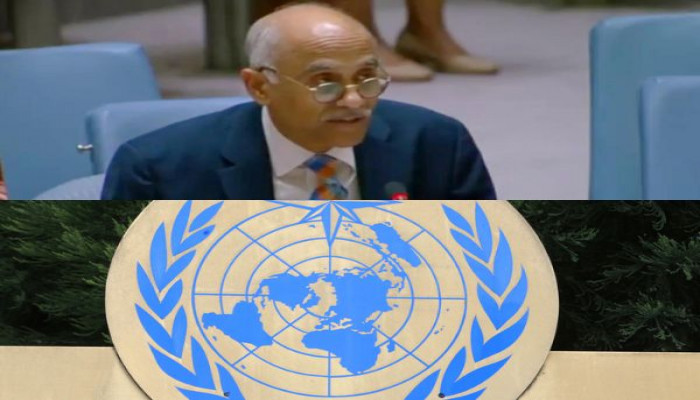India tears into Pakistan’s ‘misdirection and hyperbole’ at UN, reminds world of its systematic genocide
- In Reports
- 07:12 PM, Oct 07, 2025
- Myind Staff
India on Monday sharply criticised Pakistan at the United Nations Security Council, exposing what it called Islamabad’s “delusional tirade” on Jammu and Kashmir and reminding the world of the horrific crimes committed by the Pakistani Army during the 1971 Bangladesh Liberation War, including the genocidal mass rape of 400,000 women.
Speaking during the UNSC debate on Women, Peace and Security, India’s Permanent Representative to the UN, Ambassador Parvathaneni Harish, condemned Pakistan for once again trying to internationalise Kashmir, saying the country that “bombs its own people” and “conducts systematic genocide” has no moral ground to speak on women’s rights or peace.
“Every year, we are unfortunately fated to listen to the delusional tirade of Pakistan against my country, especially on Jammu and Kashmir, the Indian territory they covet,” Ambassador Harish said. “Our pioneering record on the women, peace and security agenda is unblemished and unscathed. A country that bombs its own people, conducts systematic genocide can only attempt to distract the world with misdirection and hyperbole.”
The remarks came after Pakistan’s Counsellor Saima Saleem raised Kashmir, prompting an immediate and forceful response from the Indian envoy.
Harish recalled one of the darkest chapters of South Asian history, Pakistan’s 1971 Operation Searchlight in East Pakistan, to highlight Islamabad’s hypocrisy. “This is a country that conducted Operation Searchlight in 1971 and sanctioned a systematic campaign of genocidal mass rape of 400,000 women citizens by its own army,” he said, reminding the Council that Pakistan’s human rights record is steeped in blood and brutality. “The world sees through Pakistan’s propaganda.”
Operation Searchlight, launched by Pakistan’s military regime in March 1971 to suppress Bengali nationalism, resulted in mass killings, sexual violence, and widespread displacement. Historians and rights groups estimate that between 300,000 and 3 million people were killed, while hundreds of thousands of women were raped as a tool of war, a legacy that continues to define Pakistan’s human rights record.
By recalling these crimes, India aimed to expose Pakistan’s strategy of using “hyperbole and misdirection” to distract from its own brutal history.
The UNSC debate, marking 25 years of Resolution 1325 on Women, Peace and Security, focused on the disproportionate impact of conflict on women and girls. The resolution, adopted in 2000, calls for protecting women’s rights during conflicts and ensuring their participation in peace processes.
Harish drew a clear contrast between India’s record and Pakistan’s history, presenting New Delhi as a responsible global actor advancing women’s security and empowerment. “Our record is unblemished,” he said, reinforcing India’s commitment not only to peacekeeping but also to gender-inclusive policies at home and internationally.
Pakistan, by contrast, was described as a country that routinely invokes Kashmir to deflect attention from internal repression and its sponsorship of terrorism. “The world sees through Pakistan’s propaganda,” Harish said, cutting through Islamabad’s rhetoric with a reminder of its blood-soaked past.
Only weeks earlier, at the UN General Assembly, External Affairs Minister S. Jaishankar had criticised nations that “openly declare terrorism as state policy” and operate “terror hubs on an industrial scale.”
“For decades now, major international terrorist attacks are traced back to that one country,” EAM Jaishankar had said, without naming Pakistan. “Those who condone nations that sponsor terror will find that it comes back to bite them.”
Harish also highlighted India’s firm commitment to the “Women, Peace and Security” agenda and its readiness to share expertise with partners, especially in the Global South, to develop collective solutions for shared challenges. He underscored India’s consistent contribution to UN peacekeeping as proof of its dedication to global peace.
“What distinguishes India's peacekeeping legacy is not merely the scale of our contribution, but our pioneering recognition of women as indispensable agents of peace,” he said.
As early as the 1960s, India deployed women medical officers to the Congo, marking one of the first instances of women serving in UN peacekeeping missions. This was not just symbolic but a practical acknowledgment that women’s perspectives, skills, and presence are essential to effective peacekeeping
In February 2025, India hosted the International Conference on Women Peacekeepers from the Global South, bringing together women from 35 nations. The two-day gathering explored the challenges women face in peacekeeping, from addressing sexual exploitation and abuse to using technology for better efficiency.
The conference was not just a platform for discussion but also for developing practical strategies to increase women’s participation and impact in future peace missions, he said.







Comments